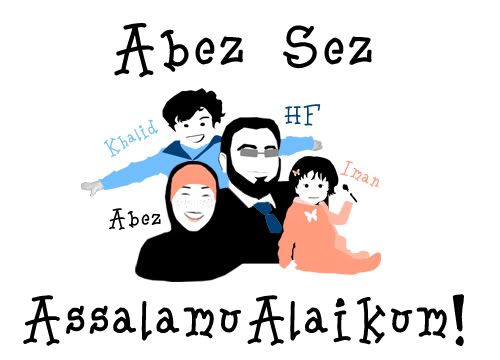Ana 'Ajmi
Here’s an interesting quiz: can you translate these two paragraphs of Arabic?Wallahi Al-atfal yajroona fil mal’aab, yal’abu kurratl-qadam.
Kuntu amshi izi dzhuribta rasi bil-kurati.
Waqata rasi ‘ala’l-ard, bi-iznillah…
~ ~ ~ ~ ~
Wa hu-al-lazi maddal-‘arda wa ja’ala feeha rawaasiya wa an-haaraa
Wa min kullis-samaraati ja’ala feeha zowjainith-naini
Yaghshil-lailan-nahaara…
Ok, so we all know a few words, right? Like Wallahi, that means 'by God.' Al-Ard, that means the earth, and we’ve spotted the word lail in the second paragraph which you know means night. The word Allah is in both of those paragraphs too. So any guesses on the meanings? If you’re like me then you might not have a very clear idea of what’s being stated above, and without a translation, you’re kind of lost actually. They could mean anything.
Now, say you’ve been assigned to recite one of these paragraphs with every ounce of religious devotion you’ve got, but not knowing what you’re saying, how do you hope to really mean what you say?
Having been raised in the US, my Arabic skills were nil until I came to Pakistan and started studying. Right now they’re half a degree up from nil, but even with my severely limited Arabic skills I have gained an understanding of the beauty of the Qur’an in its original form that I could never have gotten without being able to read the Arabic. Before that I could have recited Al-Baqra (The Cow, a chapter in the Qur’an referring to the golden calf worshipped by Prophet Moses’ followers in his absence) or a recipe for roasting beef and gotten the same understanding from it.
It’s important for Muslims to learn Arabic, not because Islam is an Arab religion, but because the Qur’an just happens to be in Arabic. God states in the Qur’an that He revealed the same Message to different people at different times in different languages, and Arabic just happens to be the language of the current revelation. Without the power to understand the Qur’an on our own we’re always going to be left with our attention wandering during prayers when the Imam recites a verse that we haven’t already memorized the translation to. Or at best, we stand in confused devotion trying to guess at the meaning and obtain guidance from a recitation that (without translation) is nothing more than a pleasant sound in our ears.
The second of those two paragraphs was from the Qur’an, and it means:
And it is He Who spread out the earth, and set thereon mountains standing firm, and (flowing) rivers: and fruit of every kind He made in pairs, two and two: He draweth the Night as a veil O'er the Day. Behold, verily in these things there are Signs for those who consider! –line 3 from Ar-Ra’ad, (The Thunder) –The Holy Qur’an
The first of those paragraphs though, is not only NOT divine, it’s also a badly written selection from my Arabic homework. Anyone wanna guess at the meaning?
Labels: Islam
 Abez Is...
Abez Is... 







0 Comments:
Post a Comment
Home